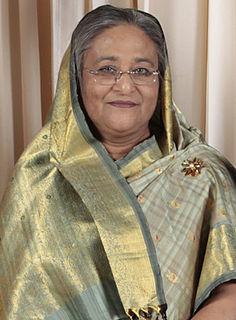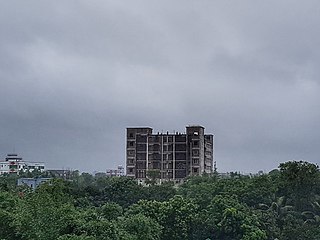Related Research Articles
Bangladesh Islami Chhatrashibir,is an Islamic student organization based in Bangladesh. It was established on 6 February 1977. The organisation is generally understood to be the student wing of Bangladesh Jamaat-e-Islami,and several of the leaders of the student organisation have gone on to become notable leaders within Jamaat. The organisation has a significant presence in higher educational institutions of the country such as University of Dhaka,University of Chittagong,Rajshahi University,SUST,BUET,DUET,Medical College. Recently however,the student Organisation has been under pressure from the Bangladesh government led by the ruling party Awami League and its student wing,the Bangladesh Chhatra League.
Dragon Group is a group of garment factories and other companies in Bangladesh. The group produces mainly for the international market and exports to more than 30 countries,especially the United States and Canada. Its subsidiary Dragon Sweater employs more than few thousand workers and in 2018 was the most traded stock on the Dhaka Stock Exchange.

General elections were held in Bangladesh on 5 January 2014,in accordance with the constitutional requirement that elections must take place within the 90-day period before the expiration of the term of the Jatiya Sangshad on 24 January 2014. The elections were controversial,with almost all major opposition parties boycotting and 153 of the total 300 seats being uncontested. Around 21 people were killed on election day.
Aminul Islam was a Bangladeshi trade unionist who was murdered in 2012 and gained international attention.

The 2012 Dhaka garment factory fire broke out on 24 November 2012,in the Tazreen Fashion factory in the Ashulia district on the outskirts of Dhaka,Bangladesh. At least 117 people were confirmed dead in the fire,and over 200 were injured,making it the deadliest factory fire in the nation's history. The fire was initially presumed to be caused by an electrical short circuit,but Prime Minister Sheikh Hasina has since suspected that the fire had been arson and an act of "sabotage" due to the occurrence of previous comparable events. This event and others similar to it have led to numerous proposed reforms in workers' rights and safety laws in Bangladesh.
2013 Bangladesh violence refers to the political instability,increase in crime and widespread attacks of minorities and opposition activists.
2013 (MMXIII) was a common year starting on Tuesday of the Gregorian calendar,the 2013th year of the Common Era (CE) and Anno Domini (AD) designations,the 13th year of the 3rd millennium and the 21st century,and the 4th year of the 2010s decade.

The 2013 Dhaka garment factory collapse was a structural failure that occurred on 24 April 2013 in the Savar Upazila of Dhaka District,Bangladesh,where an eight-story commercial building called Rana Plaza collapsed. The search for the dead ended on 13 May 2013 with a death toll of 1,134. Approximately 2,500 injured people were rescued from the building alive. It is considered the deadliest non-deliberate structural failure accident in modern human history and the deadliest garment-factory disaster in history.

Hefazat-e-Islam Bangladesh is an Islamic Advocacy group of madrassah teachers and students. In 2013,it submitted to the government of Bangladesh a 13-point charter,which included the demand for the enactment of a blasphemy law.

The Shapla Square protests also known as Operation Shapla or Operation Flash Out by security forces refers to the protests,and subsequent shootings,of 5 and 6 May 2013 at Shapla Square located in the Motijheel district,the main financial area of Dhaka,Bangladesh. The protests were organized by the Islamist pressure group,Hefazat-e Islam,who were demanding the enactment of a blasphemy law. The government responded to the protests by cracking down on the protesters using a combined force drawn from the police,Rapid Action Battalion and paramilitary Border Guard Bangladesh to drive the protesters out of Shapla Square.

Kalpona Akter is a labour activist from Bangladesh. She is the founder and executive director of the Bangladesh Center for Workers Solidarity and was awarded Human Rights Watch's Alison Des Forges award for Extraordinary Activism in 2016.

A series of public protests in Bangladesh advocating improved road safety were held from 29 July to 8 August 2018. They were sparked by the deaths of two high-school students in Dhaka struck by a bus operated by an unlicensed driver who was racing to collect passengers. The incident impelled students to demand safer roads and stricter traffic laws,and the demonstrations rapidly spread throughout Bangladesh.
The Bangladesh Garment Workers Trade Union Centre (GWTUC) is a trade union federation of garment workers in Bangladesh. It is one of the largest trade unions in that sector,with more than 20 factory trade unions affiliated to it. It has enough members to be formally recognised as a trade union,but does not have that status,as is not uncommon for left-oriented unions in Bangladesh. Politically,GWTUC is aligned with the Communist Party of Bangladesh.
The Garment Workers Unity Forum (GWUF) is a national trade union federation of garment workers in Bangladesh.
The National Garment Workers Federation (NGWF) is a registered national trade union federation of garment workers in Bangladesh. With 87 registered factory unions,it ifs considered one of the four main federations of garment workers' unions. NGWF is the initiator and a member of the Bangladesh Garments Workers Unity Council and a member of the Bangladesh Center for Workers' Solidarity. It is affiliated with the IndustriALL Global Union and one of the signatories of the Bangladesh Accord.
The Bangladesh Independent Garment Workers Union Federation (BIGUF) is a trade union federation of garment workers in Bangladesh. It is considered one of the four main federations of garment workers' unions. BIGUF is affiliated with the IndustriALL Global Union and a member organisation of the Bangladesh Center for Workers Solidarity. It is also one of the signatories of the Bangladesh Accord. Unlike many other trade unions in Bangladesh,it is explicitly not affiliated with any political party.
The Bangladesh Garments Workers Unity Council (BGWUC) is a national trade union centre in Bangladesh. The centre unites 21 garment worker trade union federations.
The 2018–2019 Bangladesh protests,also known as the Bangladeshi Social Revolution,was a series of public social unrest and Strike actions by Garment workers and Trade unions against low wages and high unemployment and demanded the resignation of the government. Over 50,000 protesters participated in the nonviolent movement. Anti-wages and anti-fee hike demonstrations loomed in Factories and Company buildings in Ashulia and Rajshahi,where most protesters staged their protest and sit-ins. Dhaka and other minor areas with factories experienced massive increasingly violent and severe street demonstrations while growing street opposition. Civil disobedience and massive labour unrest rocked the country as Garment workers and Farmers demonstrated nationwide against the results of the 2018 Bangladeshi general election,the ousting and sacking of workers in Factories,harsh working conditions and deteriorating wage conditions. Police brutality and deadly clashes was met at protest movement sites and many people were killed in the strikes and Nonviolent resistance and Civil resistance movement at towns and regions nationwide. The protests was suppressed by the military on 13 January,2019 after a wave of crackdowns for 7 days and clampdowns on the 2018 Bangladesh election violence. The result of the massive movement was mobs were arrested and 1500+ workers are sacked.
Joly Talukder is the current general secretary of the Bangladesh Garment Workers Trade Union Centre (GWTUC).
A series of rallies,demonstrations,and blockades opposing the visit of the Indian Prime Minister Narendra Modi were held in Bangladesh from 19 to 29 March,on the celebration of the birth centenary and the 50th anniversary of Bangladesh's independence from Pakistan. Accusing Narendra Modi of committing crimes against humanity during the 2002 Gujarat riots,the protesters agitated against what they alleged were India's anti-Muslim policies and India's interference in Bangladeshi politics. Protesters demanded the cancellation of the Bangladesh government's invitation to the Indian Prime Minister. The otherwise peaceful protests turned violent when the protesters were attacked by the supporters of the ruling Awami League party along with a crackdown by the law-enforcement agencies,causing the deaths of several protesters throughout the last week of March 2021 in Bangladesh. Initially launched by progressive student organizations including the Bangladesh Students Union,Bangladesh Sadharon Chhatra Odhikar Songrokkhon Parishad,and the Socialist Students' Front,the demonstrations were later joined by the Islamic group Hefazat-e-Islam Bangladesh.
References
- ↑ "Reopen closed sugar mills: LDA". 2021-01-18.
- 1 2 "Police arrest 4, including Mishu". bdnews24.com . 2010-06-25.
- ↑ "Trial against Bangladeshi labour rights advocates approaches" (Press release). Clean Clothes Campaign. 2011-05-30.
- ↑ Burke, Jason; Hammadi, Saad (2013-04-16). "Bangladesh simmers as Islamic conservatives and progressives clash". The Guardian .
- ↑ "Police detains Mishu, Jolly. Breaks Tuba workers' hunger strike firing rubber bullet, teargas shell". New Age . 2014-08-07.
- ↑ Mohammed Jamil Khan (2014-08-08). "Police drive out Tuba workers". Dhaka Tribune .
- ↑ E. Tammy Kim (2014-08-21). "Bangladeshi factory owner, out of jail, accused of more worker abuse".
- ↑ "In Solidarity with Garment Workers in Bangladesh" (Press release). Amnesty International. 2010-12-20. Retrieved 2020-12-11.
- ↑ "Amnesty urges probe into CEPZ deaths". bdnews24.com. 2010-12-22. Retrieved 2020-12-11.
- ↑ "Police keep Moshrefa Mishu 'confined' to home all-day". The Daily Star . 2015-07-13.
- ↑ Hossain, Nadim; Hasan, Md. Kamrul; Shahariar, Hussain Mohammad (2016-12-22). "DB 'invites labour leader to tea' as eight others sent to jail". Dhaka Tribune. Retrieved 2020-11-26.